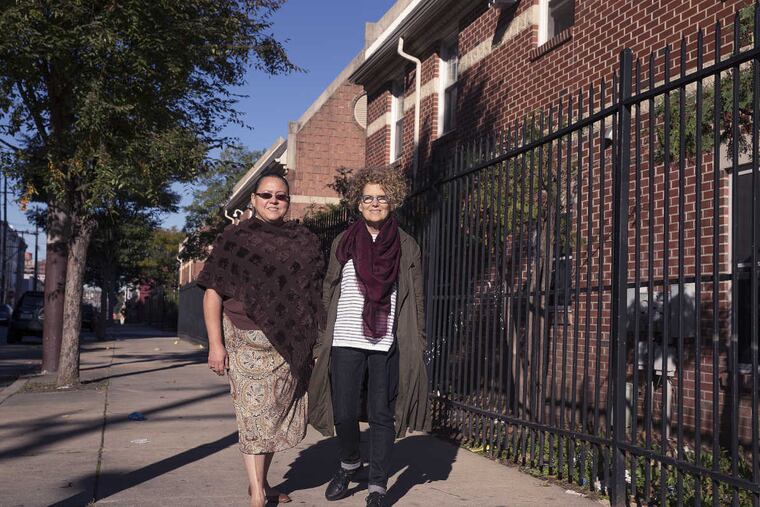Celebrating 30 years of women building houses in North Philly
Nora Lichtash had no idea what she was doing. Neither did most of the women who gathered 30 years ago in a rented Northern Liberties space. They just started talking about what they needed: housing they could afford.

Nora Lichtash had no idea what she was doing.
Neither did most of the women who gathered 30 years ago in a rented Northern Liberties space. They just started talking about what they needed: housing they could afford.
It was 1986, and the area was bleeding factory jobs, and residents were following. The families left behind - many headed by single mothers - hungered for job training, child care, better places to live. Many of the members of what would become the Women's Community Revitalization Project (WCRP) had these same needs.
Their first question was, simply, "What could we do to improve our lives?" recalled Lichtash, who was a recent Temple University biochemistry graduate, teaching GED classes at a settlement house, when she joined the WCRP. She's now its executive director.
"We felt, together, that we could do this."
Over the next three decades, those in the WCRP taught themselves to build nearly 300 housing units across the city, apartments that they have stubbornly kept affordable even as a development boom rose around them. They've built day cares and health centers and parks on abandoned lots. Tenants who moved into WCRP-built units years ago now sit on the nonprofit's board.
It is still the city's only women-led community development organization. The members cut the ribbon on their latest development last month.
"They are a major contributor in shaping the changing urban development landscape for our city and ensuring that quality affordable housing opportunities continue to exist throughout the city," said Fred Purnell, the city's deputy director for housing and community development.
At first, the group bought homes with loans and donations, rehabbing them and moving in women and families. Then the members started to build their own properties.
Their first project was completed in 1993 with public and private funding - the Adolfina Villanueva Townhomes, named for a Puerto Rican woman killed in 1980 during an eviction.
The group consulted experts, learning about design and funding and structuring a development's financing so rents could stay affordable. The learning curve was sharp at first, from navigating the ins and outs of real estate lingo - "it was all gobbledygook - stuff like 'venture selection criteria,' " Lichtash said - to the practicalities of architectural design. At Villanueva Homes, they selected ground stone in a beautiful light burgundy to line the courtyards.
The stone dust turned their tenants' bathtubs pink.
"We do our homework, and we learn some things the hard way," the Upper Darby native said, laughing.
The group's first offices were at Fourth and Fairmount Streets, in a Northern Liberties that would be nearly unrecognizable today. The luxury lofts were still factories; the trendy bars were years away.
Staci Moore, the board's cochair, joined the organization in 1997 and still lives around the corner from where the office once stood. Not many in the neighborhood, she said, expected the flood of development to come.
"When you're a woman, when you're a person of color, a person who's disabled, a person with less financial resources, you know a little bit more intimately the hardships of finding decent affordable housing," Moore said. "What you had in 1997 was a lot of people who were like, 'We want development,' without understanding the ramifications of a kit and kaboodle of luxury townhouses.
"It means you may not be living there in the next year or two."
Since its inception, Lichtash said, the organization has never built a development without a zoning fight.
Last year, after she proposed a low-income development in her own neighborhood, Germantown, a local activist told the Inquirer that Lichtash's "neighbors wouldn't want this development next to them."
"People are afraid it will lower their property values," Lichtash said. But, she said, low-income residents "have the right to be in communities and stay in communities."
WCRP members planned developments and lobbied senators while raising children and working day jobs. They canvassed neighborhoods where they planned to build new housing. They brought their children in strollers to city hearings and testified at community forums. During a long, contentious meeting at City Hall, board member Norma Santiago's toddler son threw up on a security guard. Lichtash jokes that the group's project was approved just so city officials could clear the room.
Santiago is also a WCRP tenant; she moved into the Villanueva homes in 1997 from a two-room apartment she shared with her sister, husband, and son.
"I believe that if someone's going to help you, they have to know what it's all about," she said. "These are women that went through some of the same things we were going through."
Moore, who lived with her son in a homeless shelter for a year before she joined the WCRP, said that the organization had helped her find purpose - and that its mission is more important now than ever.
"We have a lot more allies now, a lot more people that unfortunately have been hit by the development boom," she said. "We all want our city to be great and we all want development, but not with displacement."
awhelan@philly.com215-854-2961@aubreyjwhelan